Every rock fan, let alone guitar players around the world, debates this question at least once a month: “Who are the best guitarists of all time?” The problem is that everyone has various tastes and definitions of what abilities are most valuable.
Some people enjoy shredding, while others prefer slower, more melodic playing. Some prefer to understand the fundamentals, while others believe that if you don’t use jazz music theory, you’re not even on the same playing field as the greats. The best guitarists of all time included the hardest rockers who had picked up the instrument and the groundbreakers who cleared the way for them.
Making a list of the top ten guitarists on the planet is no small matter, and according to your tastes and especially to the style of music you listen to, you will only sometimes agree with this ranking. So, without further ado, in no particular order, here is the list of the top ten all-time most incredible guitar players.
Greatest Guitarists of All Time: 10 Iconic Artists.
Here are the ten greatest guitarists of all time, chosen from nearly a century of music.
1. Jimi Hendrix
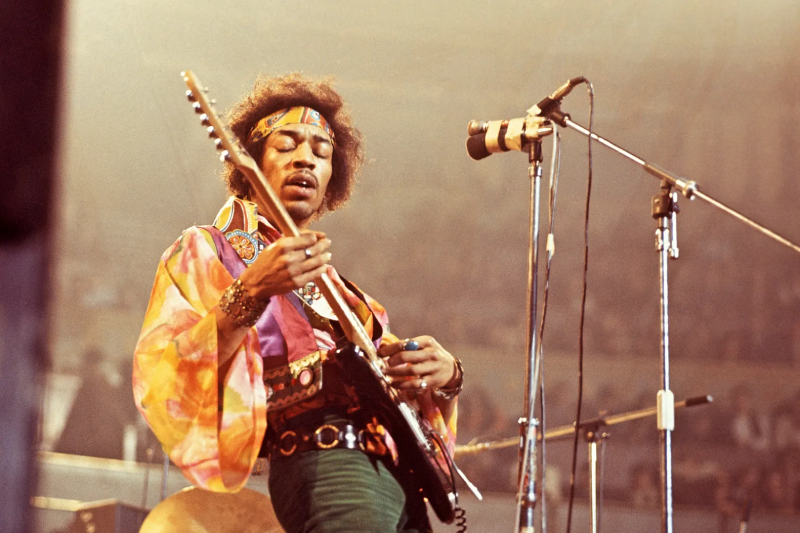
Jimi Hendrix is said by many to be the greatest guitarist of all time. American singer-guitarist Hendrix was born. Many consider him to be among the best guitarists to have ever lived. Hendrix’s albums were all commercial successes.
Before his untimely death, Jimi Hendrix enjoyed only four years of widespread popularity that completely altered the guitar world. He was among the first to present whammy bars and effects, such as wah-wah and fuzz distortion, to the guitar community. Its continuous success can be primarily attributed to his use of the Fender Stratocaster.
Early rock & roll performers like Little Richard, Chuck Berry, and Elvis Presley influenced him. Among his many “firsts” were the use of specific effects and the rejection of the barre chord in favor of fretting with his thumb. His sound combines rock, jazz, American folk music, British rock, and blues. He was an expert at soloing within chords.
His performance of “The Star-Spangled Banner” at Woodstock and songs like “Purple Haze” startled crowds and had a lasting impact that is still felt today.
2. Jimmy Page
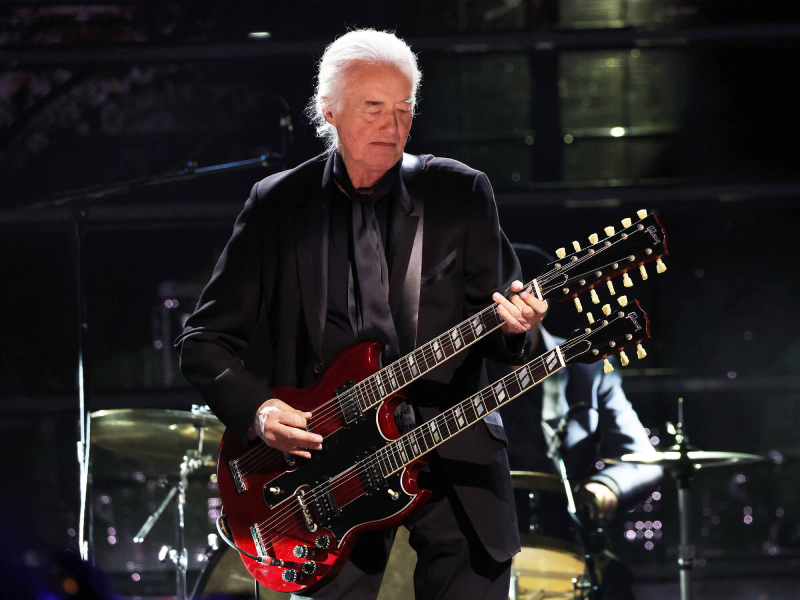
Years of polishing his chops as an on-call session musician had prepared Jimmy Page for his future role as guitarist and producer of the world’s biggest rock band, a band whose creative ambition matched the scale of their triumph.
Like Eric Clapton and Jeff Beck, Page was a Yardbirds alumni. He first played bass guitar and subsequently guitar, briefly alongside Jeff Beck. There were signs that Page would be a different type of guitarist. He used a bow on his guitar. Like Beck, he recognized the creative possibilities of high-volume, fuzz, wah, and other nice stuff and carried those creative epiphanies into Led Zeppelin.
Page would be the first to admit that Led Zeppelin’s success was due to the chemistry among the band members. There were no weak links. That meant that everything was conceivable.
Albums I and II featured riff after riff, with Page beginning with his Telecaster, a gift from Beck, progressing to the Les Paul, experimenting with more gear, acoustics, 12-string electrics, Echoplex tape echo, adding layers, and incorporating folk and blues into rock, all emulsified by his singular vision. And then some solos are teetering on the brink, with the suspense not killing you but leaving you hanging on every note to see whether he can land it. Spoilers: He did.
3. Eric Clapton
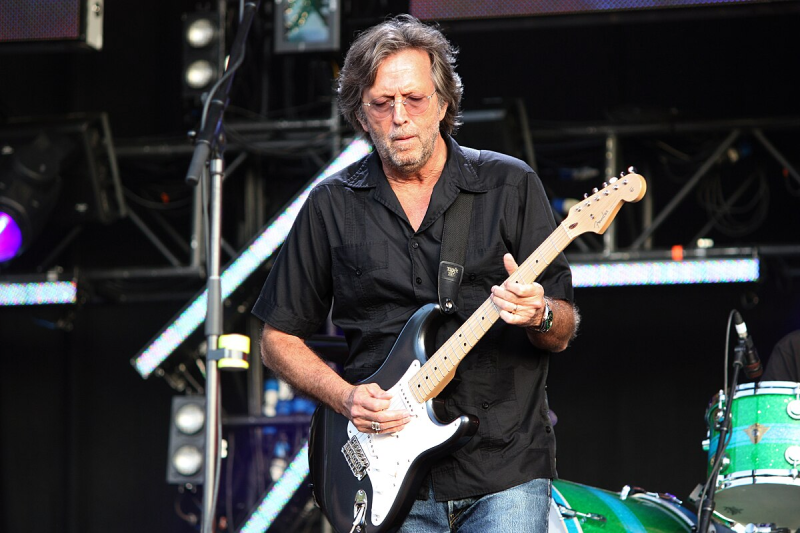
This English rock and blues guitarist’s poignant performances and delicate playing have touched millions of people. Eric Clapton’s 1991 performance of “Layla” at the Royal Albert Hall demonstrated his mastery of the human ear and solidified his reputation as a guitar maestro.
He is also called “Slow Hand” and is a multi-register virtuoso.
His global popularity, fueled by hits like “Cocaine” and “I Shot the Sheriff,” allowed him to join our time’s pantheon of guitar superstars.
His skill is most evident when he plays solos (just consider the MTV album “Unplugged”), collaborates beautifully with other musicians like Phil Collins or Mick Jones, and plays in bands like The Yardbirds and The Cream.
Many of the students who take guitar instruction also look up to him.
One of the most intriguing aspects of Clapton’s career is his involvement with several iconic bands, including The Yardbirds, Cream, and Derek and the Dominos.
Despite personal difficulties, Clapton’s devotion to the guitar remained constant, forming his place as a great guitar legend.
4. Chuck Berry
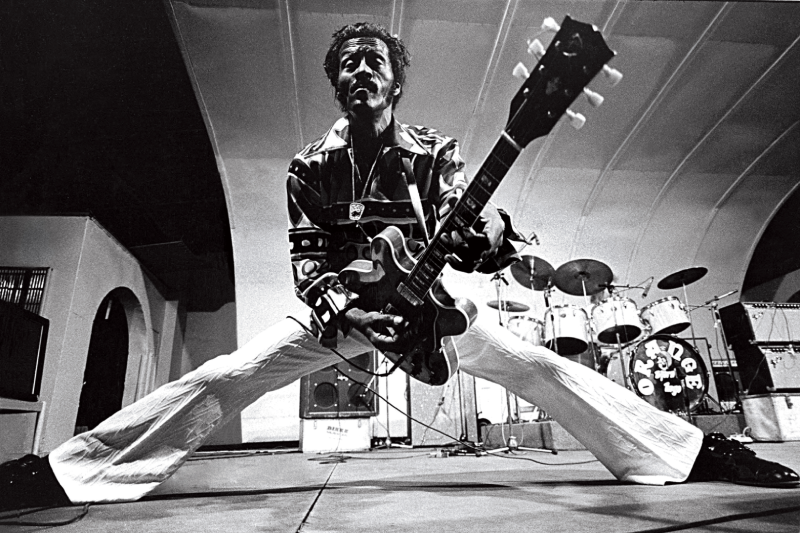
He is a rock and roll pioneer.
As a guitarist, vocalist, and songwriter, he inspired many other musicians, including Elvis “The King” Priesley.In the mid-1950s, he pioneered the guitar solo with an incendiary blend of country and blues, set to controversial lyrics about teen society.
He changed music by merging two distinct guitar genres that yearned to merge: blues and country.
Rock was thus born, and it isn’t his most famous song, “Johnny B. Goode,” that will convince us differently.
He is a true pioneer of modern music and deserves to be included among the top ten guitarists.
From the opening lick of “Johnny B. Goode” to his classic duck walk across the stage, Berry laid the groundwork for future guitar heroes to build on.
Every rock guitarist owes him a debt, and he will always be remembered as one of the finest guitarists in music history.
5. B.B. King
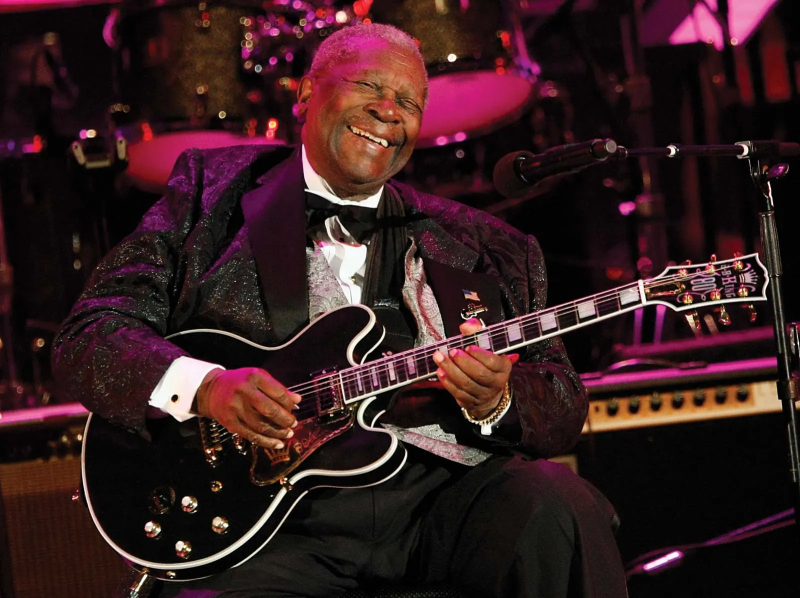
B.B. King, a legendary blues guitarist, revolutionized guitar soloing with his fluid string bending, staccato picking, and vibrant vibrato. His influence on electric guitarists was profound. King famously named all his guitars Lucille after risking his life to save one from a fire caused by a bar brawl. Known as the King of Blues, his soulful playing captivated audiences worldwide, with his iconic performance of “The Thrill Is Gone” at Montreux in 1993 standing as a timeless moment in blues history.
Blues titan B.B. King had an instantly recognizable guitar sound and vibrato tone he coaxed from his guitar Lucille to mimic vocal phrasing.
His sharp single-note runs and stinging bends opened mainstream audiences to blues when blues and rock bands like the Rolling Stones and Eric Clapton’s Cream brought electric blues into popularity in the 1960s.
One fascinating fact about King is his beloved guitar, Lucille, whose name originated from a near-fatal incident.
King risked his life to protect his guitar from a nightclub fire, later discovering that the fight that broke out was over a woman named Lucille.
The name stuck, becoming synonymous with his legendary instrument.
6. Eddie Van Halen
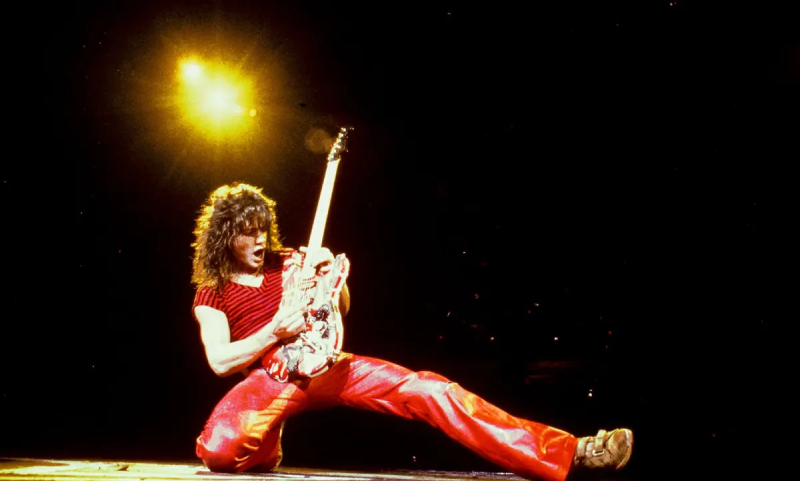
Eddie Van Halen was the most entertaining guitarist of all time, transforming electric guitar culture into a spectacle on par with the Super Bowl, Hollywood, the aurora borealis, and herds of wildebeest crossing the Serengeti.
EVH accomplished all this by constantly MacGyvering his gear, putting a Variac to use, monstering a Strat, D-Tunas, and double-locking vibratos, all in search of that tone, the so-called Brown Tone. You know it when you hear it: juicy, full of harmonics, crunch – again, so incredibly electric.
He accomplished all this by reworking the guitar player’s technique, most notably a two-handed tapping method that remained exciting in his hands even after a generation had adopted it as their own. However, no one could execute it like Van Halen; it always sounded exactly like him. That is the definition of a great guitarist. They sound like no other.
7. Stevie Ray Vaughan
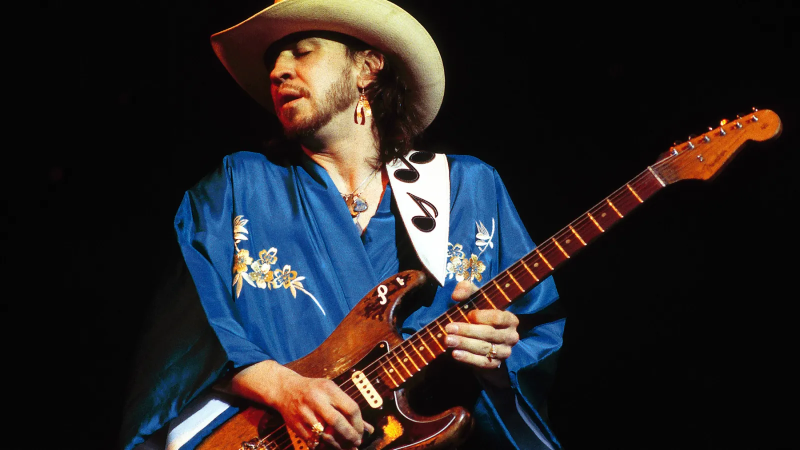
Stevie Ray Vaughan, an American musician, singer, songwriter, and record producer, was born. Even though his seven-year mainstream career was brief, he is regarded as one of the greatest electric guitar players in music history and a key player in the 1980s blues resurgence.
Stevie Ray Vaughan drove blues rock’s comeback in the 1980s, much as classic guitar rock bands looked to the genre’s pioneers in the 1950s and 1960s.
His dynamic and sophisticated approach captured the attention of listeners worldwide with hits like “Pride and Joy” and “Texas Flood.”
Although guitarist Steve Vaughan was a skilled musician, his tunes maintained the soul and basic blues framework of House. Many blues rock bands today carry on his legacy.
8. Slash
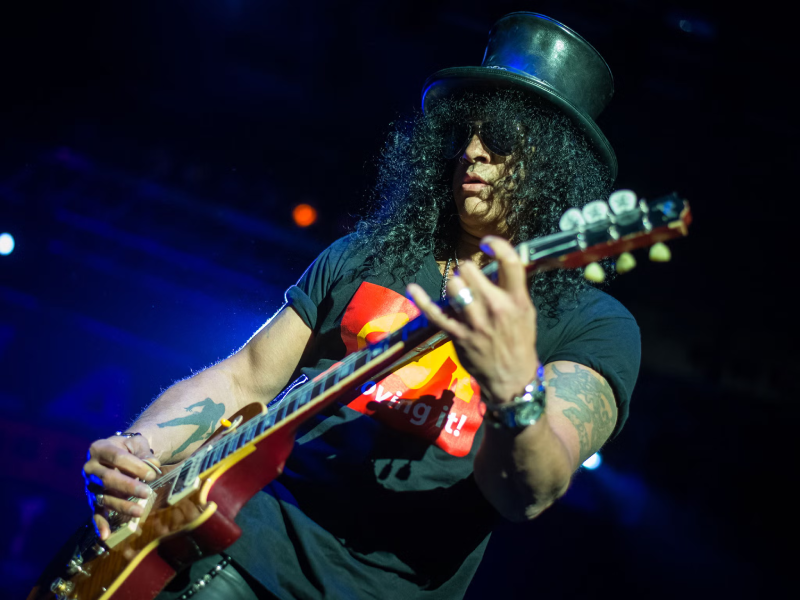
With Guns N’ Roses’ explosive 1987 first album, Appetite For Destruction, as a shining example, Slash is the quintessential rock star. His ability to move between seductive melodies and ripping solos in his raw, animalistic manner epitomized rock guitar heroism.
In an age dominated by modern guitar trends, Slash brought the Les Paul back into the spotlight, even using a replica. He effortlessly shifted between major and minor scales, showcasing the highs and lows of rock guitar.
Today, Slash defies the norm with his latest album, 4, recorded live in Nashville’s RCA Studio. The album retains a sense of danger and excitement rarely seen in today’s sanitized music landscape.
9. David Gilmour
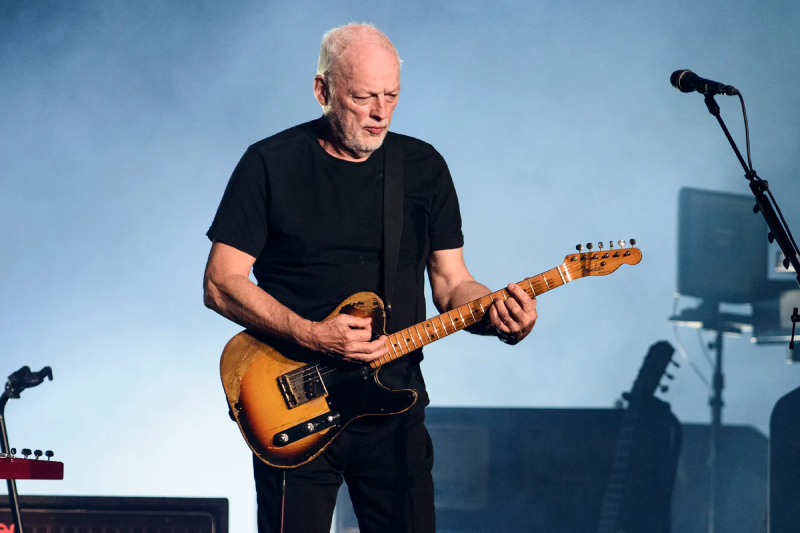
Great civilizations have grown and perished in the time it takes for one of David Gilmour’s notes to fade. Gilmour’s career has been one long struggle against time, a battle to make time dance to his music. Notes are plucked, chosen, and flown over the sky, welcoming visitors in planetary orbit for tea before elegantly returning to Earth. The impact on the audience is transcendent.
Replacing Syd Barrett in Pink Floyd took a lot of work. Conversely, Gilmour possessed the vision, chops, and familiarity with a Binson Echorec to elevate the British progressive rock heroes’ sound to new heights.
Gilmour’s guitar and songwriting prowess enabled Pink Floyd to venture into big concept albums without being weighed down by the gravitational weight of their ambition. Because, of course, it’s not just that fantastic Strat tone carried on the wings of fuzz and echo; it’s the writing, the variations, all carefully timed to hit an emotional punch and make us contemplate big thoughts along the way.
10. Angus Young
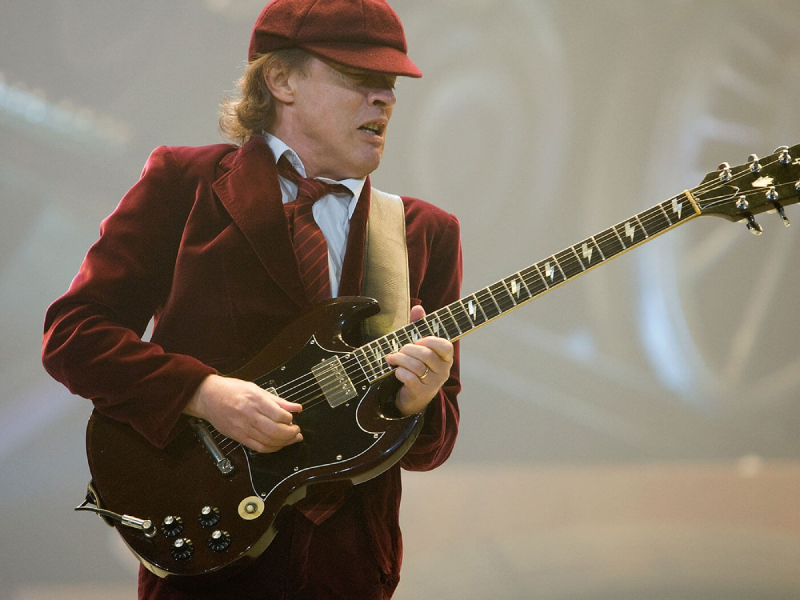
Angus Young embodies rock and roll energy with his electric stage presence and schoolboy attire. His straightforward blues-inspired riffs are the main ingredient in AC/DC’s distinctive sound.
Rock songs with raw force and simplicity, such as “Back in Black,” “Highway to Hell,” and “Thunderstruck,” are examples of this.
Many guitarists who long for the visceral strength of rock and roll have found inspiration in Young’s minimalist approach, emphasized by his characteristic bluesy solos.
The Last Line
These ten guitarists are just a tiny sample of the extraordinary talent influencing guitar music around the globe. They have pushed the boundaries of the instrument and influenced innumerable musicians.
Their music speaks to listeners worldwide, from Chuck Berry’s enthusiasm to Jimi Hendrix’s mastery and B.B. King’s soul. So turn on your favorite music and enjoy these guitar superstars’ incredible legacy!







